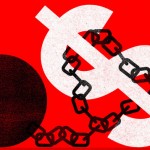
“In this environment, policy makers are finding their authority, credibility and firepower being tested. In turn, they are finding it tempting to pursue ‘financial repression’—suppressing market prices that they don’t like. But this is bad policy, not least because it signals diminished faith in the market economy itself. In environments of financial repression, businesses are keener to retrench than recommit their time, energy and capital to new projects. Trillions of dollars of private capital remains on the sidelines. And the private-sector engine that drives prosperity sputters .. Financial repression is sometimes the effect of policy even if it is not the intent. It manifests itself, for example, when policy makers react more forcefully to declines in asset prices than to increases. Price increases tend to be treated with benign indifference. But declines often lead policy makers to respond with force, deploying fiscal stimulus and monetary accommodation. Market participants then conclude that governments have their backs .. The Federal Reserve’s continued purchase of long-term Treasury securities risks camouflaging the country’s true cost of capital .. With financial repression at play, we risk missing early warning signs from markets that our debt burden is intolerable .. Financial repression embeds the wrong incentives—obfuscation begets delay, and a robust recovery becomes unattainable .. Financial repression is a tactic that may help get us through the week or month or year. But it will come at a substantial cost to our long-term prosperity.”
– Kevin Warsh, Former Federal Reserve Governor, a distinguished visiting fellow at Stanford University’s Hoover Institution, on the Steering Committee of the Bilderberg Group




 02/21/2015 - Kevin Warsh on Financial Repression
02/21/2015 - Kevin Warsh on Financial Repression


